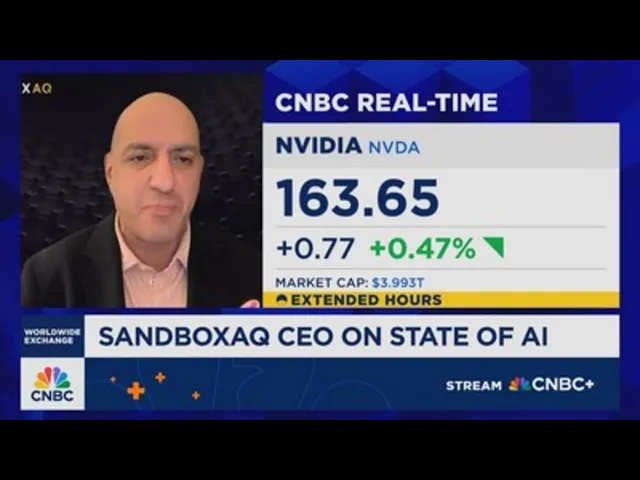SandboxAQ CEO on Nvidia’s growth and the continued soaring demand for AI

Nvidia's meteoric rise shapes AI's future
In the ever-evolving landscape of artificial intelligence, certain companies emerge as kingmakers that fundamentally reshape the industry's trajectory. Such is the case with Nvidia, whose extraordinary market performance has captivated investors and technologists alike. SandboxAQ CEO Jack Hidary recently shared his perspective on Nvidia's remarkable growth and what it signals about the broader AI ecosystem, offering insights that help us understand not just where we are, but where we're headed.
Key observations from Hidary's analysis
-
Nvidia has successfully transformed from a gaming-focused company to an AI infrastructure giant, leveraging its GPU technology to become the dominant player in the computational backbone that powers modern AI systems.
-
The company's strategic positioning isn't accidental but the result of CEO Jensen Huang's deliberate, decade-long vision to reorient the company toward AI computation, making prescient bets on the industry's direction.
-
Demand for AI computation continues to vastly outstrip supply, creating a significant backlog for Nvidia's chips and indicating that we're still in the early stages of the AI revolution despite the impressive advances we've already witnessed.
-
The need for specialized AI chips extends beyond data centers to edge devices, suggesting the next frontier of AI development will include bringing powerful computation capabilities to smartphones and other consumer devices.
-
Quantum computing represents a complementary rather than competitive technology to classical AI computation, with both advancing in parallel to address different classes of problems.
The most compelling insight from Hidary's analysis is that we're witnessing a profound architectural shift in computing, not merely a temporary surge in demand. "This is not just a blip," Hidary emphasized. "This is a fundamental shift in the architecture of computation." This observation matters enormously because it suggests the AI revolution isn't simply about enhancing existing computing paradigms—it's about establishing entirely new foundations for how we process information.
This architectural shift has profound implications across industries. Traditional CPU-centric computing environments are giving way to heterogeneous systems where specialized accelerators—GPUs, TPUs, and purpose-built AI chips—handle specific computational workloads with unprecedented efficiency. Companies that fail to adapt to this new reality risk becoming irrelevant as competitors leverage these architectural advantages to deliver superior products and services.
What
Recent Videos
How To Earn MONEY With Images (No Bullsh*t)
Smart earnings from your image collection In today's digital economy, passive income streams have become increasingly accessible to creators with various skill sets. A recent YouTube video cuts through the hype to explore legitimate ways photographers, designers, and even casual smartphone users can monetize their image collections. The strategies outlined don't rely on unrealistic promises or complicated schemes—instead, they focus on established marketplaces with proven revenue potential for image creators. Key Points Stock photography platforms like Shutterstock, Adobe Stock, and Getty Images remain viable income sources when you understand their specific requirements and optimize your submissions accordingly. Specialized marketplaces focusing...
Oct 3, 2025New SHAPE SHIFTING AI Robot Is Freaking People Out
Liquid robots will change everything In the quiet labs of Carnegie Mellon University, scientists have created something that feels plucked from science fiction—a magnetic slime robot that can transform between liquid and solid states, slipping through tight spaces before reassembling on the other side. This technology, showcased in a recent YouTube video, represents a significant leap beyond traditional robotics into a realm where machines mimic not just animal movements, but their fundamental physical properties. While the internet might be buzzing with dystopian concerns about "shape-shifting terminators," the reality offers far more promising applications that could revolutionize medicine, rescue operations, and...
Oct 3, 2025How To Do Homeless AI Tiktok Trend (Tiktok Homeless AI Tutorial)
AI homeless trend raises ethical concerns In an era where social media trends evolve faster than we can comprehend them, TikTok's "homeless AI" trend has sparked both creative engagement and serious ethical questions. The trend, which involves using AI to transform ordinary photos into images depicting homelessness, has rapidly gained traction across the platform, with creators eagerly jumping on board to showcase their digital transformations. While the technical process is relatively straightforward, the implications of digitally "becoming homeless" for entertainment deserve careful consideration. The video tutorial provides a step-by-step guide on creating these AI-generated images, explaining how users can transform...
